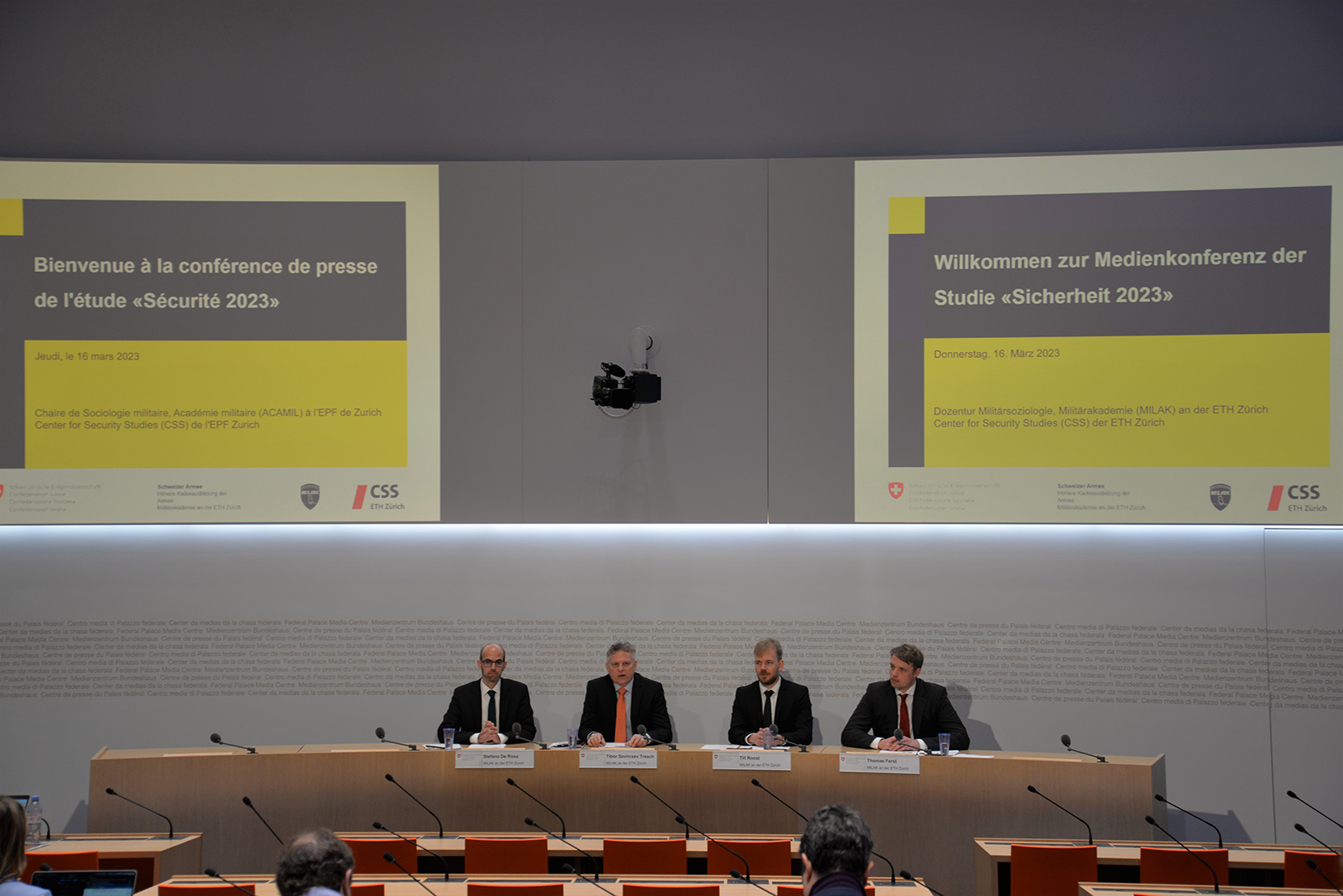Survey Security 2023: slight majority for NATO rapprochement - more critical assessment of neutrality
Since the outbreak of the war in Ukraine, the future of Switzerland and the world has been viewed more pessimistically and neutrality more critically. The willing-ness to cooperate is increasing: a slight majority of the Swiss population calls for a rapprochement with NATO. Voters also want to strengthen the defense ca-pability. This is shown by the evaluations of the "Sicherheit 2023" survey, which is published by the Military Academy (MILAK) at ETH Zurich and the CSS at ETH Zurich.

Download To the report on the media conference of March 16, 2023 (in German) (PDF, 7 MB)
Voters are more pessimistic about the future of Switzerland (19%, +6 percentage points since January 2022) and the world (75%, +7 pp). When asked about the three greatest threats, war, climate and economic crises were mentioned. Compared to 2019, trust in the USA has increased significantly and trust in China and Russia has fallen sharply.
Slight majority for NATO rapprochement
In January 2023, 55% (+10 pp compared to January 2021) agree to NATO rapprochement, which means that for the first time a slight majority of Swiss people agree to rapprochement with NATO. 53% believe that neutrality allows Switzerland to plan military defense together with NATO. On the other hand, joining NATO is still only supported by a third of those surveyed.
A more critical view of neutrality
Approval for neutrality in general (91%, -6 pp compared to January 2022), as well as for the various functions of neutrality such as mediation (91%, -6 pp), identity (80%, -7 pp) and conflict avoidance (55% , -14%) have fallen significantly. The question of whether neutrality can no longer be credibly protected by military means split voters (52%, +5 pp). Membership in a European defense alliance is demanded significantly more (35%, +12 pp compared to January 2021). More respondents think that our close political and economic ties with other countries make neutrality impossible (38%, +9 pp) and that it prevents Switzerland from acting jointly with its European neighbors (41%, +13 pp compared to 2021 ). A majority (57%, ±0 pp) is still in favor of Switzerland's differential policy of neutrality, i.e. it should take a political stand but be militarily neutral. A clear majority remains of the opinion that the sanctions against Russia are compatible with neutrality (75%, -2 pp since June 2022).
Strengthen Switzerland's defense capability
Voters continue to show a positive attitude towards the army. Both, support for the necessity (78%, +3 pp since January 2022) and the call for a "fully equipped" army (76%, +6 pp since January 2022) have increased. Changes since the outbreak of war in Ukraine can also be seen in the assessment of defense spending. 14% (+7 pp compared to January 2022) of those surveyed rate army spending as “too little”.
Conducting the survey
Between January 3rd and 20th, 2023, 1238 eligible voters from German-speaking Switzerland, French-speaking/Western Switzerland and Ticino were interviewed by telephone by the opinion research institute LINK. With a confidence level of 95%, the sampling error is ±2.8% in the worst case.
Download To the report on the media conference of March 16, 2023 (in German) (PDF, 7 MB)
The survey Security 2023 (“Sicherheit 2023”) will be published in June 2023
Some media reports on the evaluations of the survey
external page Tages-Anzeiger (in German)
external page NZZ (in German)
external page Aargauer Zeitung (in German)
external page SRF Tagesschau (in German)
Contact/Enquiries:
Dr. phil. Tibor Szvircsev Tresch
Editor-in-chief of the "Security" study series / Lecturer in Military Sociology
Tel.: +41 58 484 82 32, Mobile: +41 79 333 22 51
Publisher: Defense